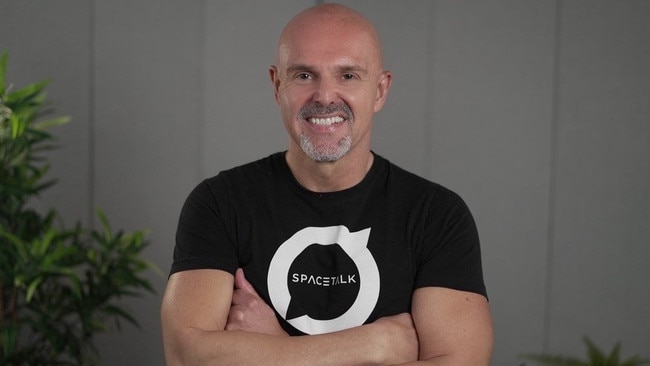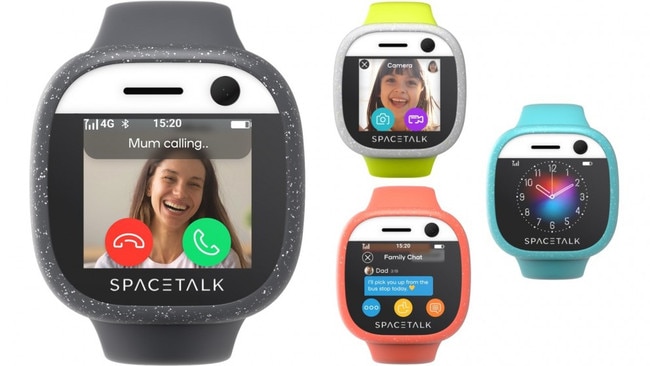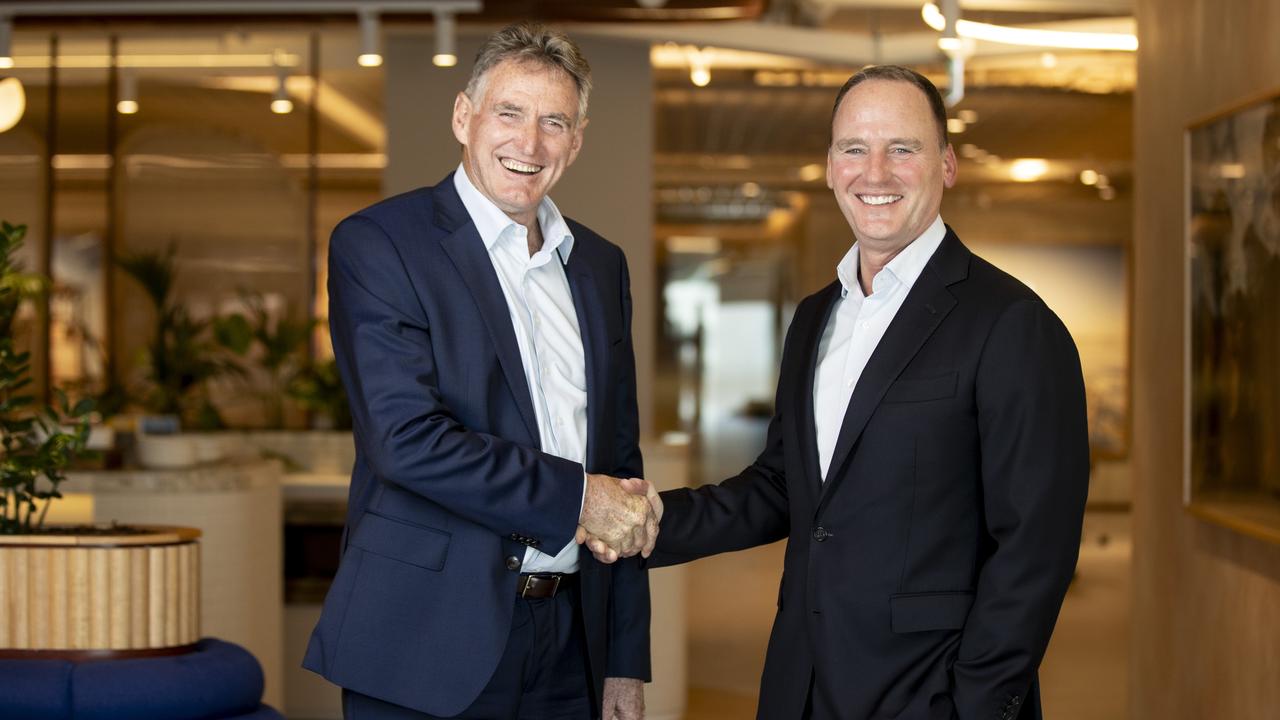Former Nearmap boss Simon Crowther has high hopes for wearables firm Spacetalk
Spacetalk boss Simon Crowther is not interested in heading up a micro-cap stock, which is why he’s determined to transform the company he’s led for just over a year.

Business
Don't miss out on the headlines from Business. Followed categories will be added to My News.
Former Nearmap managing director Simon Crowther says he has no interest in running a company valued at 2c a share.
But that’s exactly what he’s currently doing, so what gives?
Mr Crowther took over as managing director at Adelaide tech minnow Spacetalk a little over a year ago.
The company has had its ups and downs – more downs in recent years – as it has tried to take on the big players in the wearables space, with its smartwatch designed for children.
That itself was a big pivot for the company, which previously had focused on school software technology, among other things helping schools and parents track when kids showed up to school.
The Spacetalk wearables product has a good sell, focusing on giving parents the ability to track and communicate with their children via a smartwatch, without the dangers and distractions of full online operability, which competitors including Apple offered.
But the product had a key flaw from a business perspective, in that its owners soon grew out of the age range it’s intended for.
Children entering their teens generally graduated to their own handset and perhaps a new smartwatch, keeping churn high.
Being a hardware manufacturer taking on the global incumbents was always going to be a massive challenge too.
The difficulties were reflected in the company’s loss-making balance sheet, and in October 2022, Spacetalk’s board axed founding managing director Mark Fortunatow and started the search for a new leader.
For his part, Mr Crowther says he wasn’t exactly looking for a job – more a new challenge for himself and chief operating officer Craig Boshier.
The pair had worked together on two previous ventures. And following Mr Crowther’s experience scaling up Nearmap in its early days, and working as a venture partner at Yamaha, based in the US and Canada, as well as across a number of US software businesses, he could see promise in the beleaguered Spacetalk.
“Essentially Craig and I sort of talked to the board as a partnership,’’ Mr Crowther says.
“We’d instantly spotted the opportunity to build and grow Spacetalk in a different way.
“I think the company had done reasonably well in terms of establishing a brand and product/market fit for kids’ wearables devices, but I think the challenge has been about how they executed and the lack of structure and discipline around growing the business.
“I think there was an inherent limitation in that approach, which is that the kids’ market is limited in the sense that being hardware-driven, there was a relationship with a child for a couple of years until they then decided they wanted their first mobile phone.

“At that point, they churned out … so the customer lifetime value was actually quite limited.
“We saw the opportunity of extending that relationship, building the addressable market and having a much deeper and longer relationship, not only with the child, but also looking at the child from a life-stages perspective and that then grew into this kind of family view.’’
Twelve months on, the vision is starting to come together.
A key element was bundling their own mobile plans with Spacetalk’s wearable devices.
The idea was that children would hopefully take their plan with them even if they move on from their Spacetalk device, while the SIM-only plans could also compete in their own right in the telco marketplace.
Mum and dad could also get their own plan, with Spacetalk riding on the back of the Telstra network, providing ample data packages and wide coverage.
Spacetalk reported in its December quarterly results that subscriber growth for Spacetalk Mobile was up 58 per cent over the previous quarter to 26,000 active subscribers, and annual recurring revenue was up 28 per cent over the previous corresponding period to $9.5m.
The company is targeting neutral free cash flow during the second half of this calendar year, and it had $2.9m in the bank at the end of December.
The mobile plans, plus an upgraded Spacetalk app, provide a pathway to extend the customer relationship well beyond its previous limitations, with the app enabling parents to locate their children, set geographic safe zones and chat, among other functionality.
“We kind of morphed over the last 12 months from being a wearables-focused business into now a wearables-enabled mobile and software subscription business, which has a very different view of the world,’’ Mr Crowther said.
“You’ll see a continued evolution of our revenue mix, where hardware sales just become a component of an overall mix of revenue, but largely subscription revenue starting to take over. Which I think is far more valuable for investors, and far better for us as an organisation to be managing those relationships going forward than just a one-off hardware sell.’’
With the company building a relationship with children, teens and their parents, another key part of the plan, and potentially a huge market, is the seniors space, where wearables can provide a valuable function in health monitoring, and helping people live independently for longer.
Mr Crowther said the seniors space included a lot of devices – such as pendants with emergency alarms – which used the 3G network that is currently being phased out.
Such products were not well utilised, with emergency alarms lacking the ease of use of a smartwatch.
“There’s a lot more people in their 50s and 60s now who are opting to stay in the same place – they don’t want to be going to a nursing home or a care facility,’’ Mr Crowther said.
“But their family wants to make sure that they’re OK and if there is a problem that they can get there quickly.
“The market for monitoring and safety and security is big and that’s something that we are going to be getting very serious about.
“So you can see now that we’ve got a relationship that starts with a young child with a wearables device, we transition them into a customer as a teen and tween.
“We’re also selling a family bundle to mum and dad from a Spacetalk mobile perspective. “And we’re also selling a valuable piece of hardware to grandma and granddad as well, and we want to do that on a national scale.’’
In the seniors market there would also be the opportunity to use predictive analytics on the health front, to value and keep people safe, Mr Crowther said.
He said the company had focused on building its recurring revenue base on the mobile front, and now they were serious about moving towards profitability.
To that end the company pulled back from previous ambitions to conquer international wearables markets, now preferring to get the recipe right in Australia before heading back overseas.
“So we’re not burning cash, we’ve reduced the complexity inside the business,’’ Mr Crowther said.
“That’s been my primary objective since day one – proving that the model works and showing quarter on quarter that our subscription base is growing, so that we have that locked in revenue for the future.’’
Mr Crowther said Spacetalk was targeting $20m-$25m in recurring revenue in the next couple of years, excluding hardware sales.
“I have ambitions to grow very successful business. I’m not interested in running a two cent share price,’’ he says.
Thorney Investment group is a major shareholder in the company, with a 22.8 per cent stake.
The company’s shares closed at 19c each on Friday, valuing the company at $9m.
More Coverage
Originally published as Former Nearmap boss Simon Crowther has high hopes for wearables firm Spacetalk





